[Policy Recommendations] Requests for the FY2022 Revision of the Medical Service Fee Schedule for the Control of Antimicrobial Resistance (October 12, 2021)
- Home >
- Information >
- News >
- [Policy Recommendations] Requests for the FY2022 Revision of the Medical Service Fee Schedule for the Control of Antimicrobial Resistance (October 12, 2021)
Tokyo, October 12th, 2021 – AMR Alliance Japan (Secretariat: Health and Global Policy Institute (HGPI)) released requests for the FY2022 Revision of the Medical Service Fee Schedule for the Control of Antimicrobial Resistance. A summary of the requests is as follows.
Over time, bacterium that cause infectious diseases grow immune to the drugs used to treat them. This naturally occurring process is called “antimicrobial resistance” (AMR). This problem can lead to deaths due to infectious diseases that were otherwise preventable. Globally, at least 700,000 people die annually from AMR. If current global trends continue, an estimated 10 million people could die of AMR-related causes every year by 2050. To counter AMR, measures are now advancing around the world. Furthermore, in Japan, approximately 8,000 people already die every year from AMR-related causes, which is more than twice of traffic accidents. Given that Japan’s faces an aging population and globalization, the impact of AMR is likely to grow. To address this issue, we request the current medical service fee schedule be revised to reflect the recommendations described below.
1. The revised schedule should facilitate consultations with specialists in infectious disease control.
2. The revised schedule should support the placement of infectious disease specialists at university and core hospitals.
3. The revised schedule should expand patient eligibility for the premium to support pediatric antimicrobial stewardship measures.
4. The revised schedule should facilitate proactive screening for AMR bacteria.
5. The revised schedule should enable rapid bacterial culture identification testing.
6. The revised schedule should enable rapid antimicrobial susceptibility testing.
7. The revised schedule should cover therapeutic drug monitoring during outpatient treatment with voriconazole.
8. The revised schedule should facilitate AMR gene detection.
Please see below the PDF file for details.



